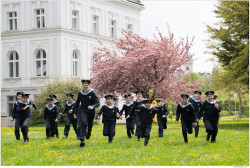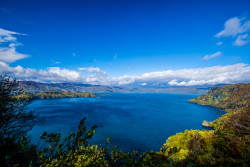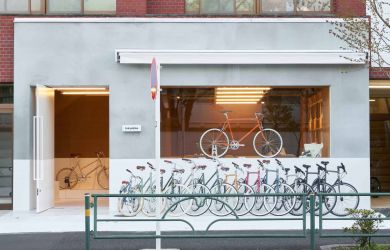
Originally published on metropolis.co.jp on May 2011

Eparama Tuibenau
TERRORISTS, SCHMERRORISTS
- Diplomatic cables recently obtained through WikiLeaks showed that US government officials “were concerned Japan was taking a lackadaisical approach toward defending its nuclear power plants against terrorist attacks.”
- Other cables released by WikiLeaks revealed that the US “padded the expense for the planned relocation of Marine troops to Guam from Okinawa and the number of personnel affected.”
- A New York Times report, based on cables released by—you guessed it—WikiLeaks, said that in 2009 Obama and his boys “warned Japan under then-Prime Minister Yukio Hatoyama about its wavering policies on bilateral ties.” Relations with China and the US Marine base in Okinawa were apparently issues of concern for the Yanks.
- Japan and the US are reportedly mulling a plan to store spent nuclear fuel at a disposal facility in Mongolia. Gee, wonder if the Mongolians know about this?
LAKE OF SORROWS
- A University of Tokyo graduate student noted that a severely quake-damaged area in Fukushima is thought to have been the same location where the very large Lake Koriyama existed 100,000 years ago. A mere coincidence? We think not.
- Kids evacuated from tsunami-hit areas and evacuees staying at the Grand Prince Hotel Akasaka took part in a tug-of-war with jet airplanes at Haneda Airport, part of the “Smile! Be Happy!” campaign.
- Here we go again … TEPCO said it found “an abnormality” in a valve at the Kashiwazaki-Kariwa nuclear power plant in Niigata, used to pump cool water to reactors in the event of an emergency.
- Meanwhile, TEPCO President Masataka Shimizu was on his knees during a trip to Fukushima, apologizing to people forced to evacuate by the nuclear crisis. Not satisfied with his apology, one guy had yelled, “Kneel on the ground!” Shimizu and his lackeys did just that.
- Scientists are looking at using rape plants to extract harmful radiation out of the soil in Fukushima—something they have been trying out in areas near Chernobyl.
- Speaking of which, levels of radiation found in soil near Fukushima’s plant “far exceeded the level of radiation the then-Soviet Union had used as a criterion for urging people to evacuate at the time of the 1986 Chernobyl nuclear disaster,” according to the Ministry of Education, Culture, Sports, Science and Technology, in collaboration with the U.S. Department of Energy.
- US researchers say that debris from the March 11 tsunami will hit the West Coast of North America in three years and twice be deposited in Hawaii, “leading to potential environmental and economic damage” by affecting fishing and shipping.
- The International Pacific Research Center of the University of Hawaii at Manoa said debris from Japan, including parts of buildings and cars, will reach Hawaiian waters in 2012 and in 2014 the floating garbage will land in “California and Alaska in the United States, British Columbia in Canada and Baja California in Mexico.”
- A government study revealed that fires and the March 11 tsunami destroyed over 1,600 hectares of forest in Iwate, Miyagi and Fukushima prefectures.
GIVE US A BREAK ALREADY
- Producer Yasushi Akimoto is at it again. On the heels of his mega-popular Akihabara-based girl group AKB48, and offshoots SKE48 from Nagoya and Osaka’s NMB48, we are now being graced with HKT48 from Fukuoka, exciting fans of untalented 15-year-old pop divas the world over.
- A Hello Kitty theme park will open in China’s Zhejiang Province in 2014. No word yet on whether cat burgers will be featured on concession stand menus.
- A TBS athletic competition TV show called “Sasuke,” which features people navigating a nasty obstacle course, has been picked up by US network NBC to be run in prime time back in the States.
- The Wakayama prefectural government gave fishermen from the controversial whaling town of Taiji permission to extend their annual dolphin hunt by a month to catch about 200 long-finned pilot whales—members of the dolphin family.
- Two planes, one landing and another taking off, barely avoided a collision in Fukuoka after air traffic controllers told both of them to use the same runway.
DEATH BY YAKINIKU
- A 70-year-old woman was the fourth person to die after eating tainted raw meat at a Yakiniku Zakaya Ebisu restaurant in Toyama Prefecture.
- An Osaka clothing company exec was deported back to Japan from Macao to face charges of killing the president of his firm and dumping his body in Mie Prefecture in 2000. The suspect had been serving a prison sentence in Macao for murdering a Chinese woman and injuring another person.
- A young woman received a kidney from her brain-dead mom, the first case of a family member being prioritized since Japan revised its organ transplant law last year, the Japan Organ Transplant Network said.
- A soy sauce maker in quake/tsunami-hit Iwate Prefecture, whose whole operation was swept away March 11, managed to retain a wee bit of moromi, the key ingredient in flavoring their sauce. There will be soy again!
- A government rescue effort was finally organized for pets left in the 20km “no-entry zone” around the Fukushima nuclear reactor. Officials said it was unknown how many dogs and cats were still alive more than two weeks after entry to the area was banned. Our guess is not many.
- Headline of the Week, via The Mainichi Daily News: “Suspension of Hamaoka nuke plant sparks battle between common sense and outdated thinking”
- Japanese actor Ken Watanabe has brought together a star-studded field of celebrities to make videos calling for donations “to help Japan recover from the March 11 disaster and express solidarity with the victims.” Among the many celebs involved are actors Leonardo DiCaprio, Johnny Depp, Ben Affleck, Jamie Lee Curtis, major-leaguer Hideki Matsui and singer Katy Perry.
DRIVING A HARD BARGAIN
- With thousands of vehicles destroyed in the March 11 tsunami, some unscrupulous used car dealers in the disaster area are reportedly gouging buyers.
- An Osaka man in his 60s had to work at the crippled nuclear power plant in Fukushima Prefecture for two weeks when he had been expecting to work in Miyagi Prefecture. The man was paid ¥24,000 a day as a temp worker, double what he was initially promised, but he said: “I was finally issued a radiation dosimeter on my fourth day of work there.”
- Some Japanese users of Apple’s iPhone have been unknowingly charged additional communication fees, prompting the Internal Affairs and Communications Ministry to tell Softbank Mobile to fix the situation.
- A survey found that over two million people in Japan were likely receiving welfare benefits as of February, making it the second-highest level in the postwar period.
- The lawyer of a 36-year-old Japanese nurse who faces a death sentence in Malaysia for drug smuggling told reporters that things were not looking good for his client. Thanks for the confidence, bud.
Compiled from reports by AP, Japan Today, The Japan Times, The International Herald Tribune, The Asahi Shimbun, The Mainichi Daily News, Daily Yomiuri, AFP, Reuters and Kyodo.







